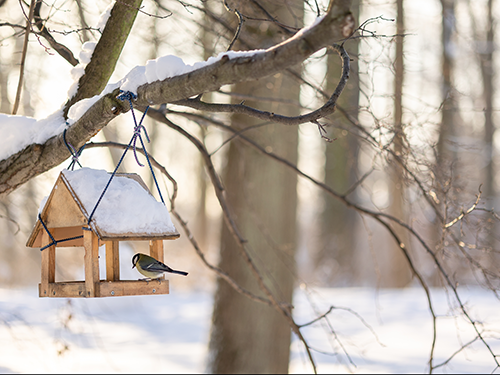Simple Tips for Storing Birdseed
Jan 27, 2025

As temperatures remain cool, your backyard becomes a busy gathering spot for a variety of birds like finches, sparrows, woodpeckers, and cardinals. Whether you’re an avid birdwatcher or just love seeing these feathered friends visit your yard, one thing is certain: they’re all coming for the same reason — a good meal!
At Co-op, we understand how rewarding it is to care for your backyard birds, and we want to help you keep them well-fed. As more birds discover your feeders, you might find yourself buying larger amounts of birdseed, even purchasing in bulk. To make sure your seed stays fresh, and your birds stay healthy, here are five helpful tips for storing birdseed:
1. Always Buy Fresh Birdseed
It’s easy to assume that all birdseed on store shelves is fresh, but that’s not always the case. Birdseed that’s been sitting too long can develop mold, clump together, or attract pests. When shopping, check the seed for a clean appearance and avoid anything that smells musty or seems spoiled. At Co-op, we take pride in inspecting every bag of feed to ensure it’s fresh, nutritious, and safe for your wildlife.
2. Store Seed in a Cool, Dry Place
Birdseed lasts longer and stays fresher when kept in a cool, dry location. A garage, shed, or even a patio storage box can work well, as long as it’s shielded from moisture and extreme heat. If you live in a warmer climate, avoid storing seed outdoors to prevent it from spoiling.
3. Use Sturdy, Sealed Containers
Invest in durable storage containers to protect your birdseed from pests and the elements. Heavy-duty plastic bins or galvanized metal cans with tight-fitting lids are excellent options. Keeping your seed sealed not only preserves its freshness but also keeps rodents, insects, and water out.
4. Keep Your Feeders Fresh
It’s not just the seed in storage that needs attention — the seed in your feeders should also be fresh. If you notice seed sitting untouched in your feeder for a while, it’s likely gone stale or attracted moisture. Birds are picky and won’t eat spoiled seed, so be sure to clean out your feeders regularly and replace old seed with fresh stock.
5. Choose Birdseed with Shells
Birdseed with natural shells, like black oil sunflower seeds, tends to last longer and stays fresher when stored properly. Plus, these seeds are a favorite among many bird species! For other types of seed without shells, consider buying smaller quantities to avoid waste.
By following these tips, you’ll ensure your seed stays fresh and nutritious, and your yard stays bustling with activity. For all your wild bird essentials — including high-quality seed, feeders, birdhouses, and storage containers — stop by your local Co-op. We’re here to help you make the most of your backyard birding experience!
Find the nearest Co-op location here. For more seasonal farm tips, check out the latest issue of The Cooperator.
At Co-op, we understand how rewarding it is to care for your backyard birds, and we want to help you keep them well-fed. As more birds discover your feeders, you might find yourself buying larger amounts of birdseed, even purchasing in bulk. To make sure your seed stays fresh, and your birds stay healthy, here are five helpful tips for storing birdseed:
1. Always Buy Fresh Birdseed
It’s easy to assume that all birdseed on store shelves is fresh, but that’s not always the case. Birdseed that’s been sitting too long can develop mold, clump together, or attract pests. When shopping, check the seed for a clean appearance and avoid anything that smells musty or seems spoiled. At Co-op, we take pride in inspecting every bag of feed to ensure it’s fresh, nutritious, and safe for your wildlife.
2. Store Seed in a Cool, Dry Place
Birdseed lasts longer and stays fresher when kept in a cool, dry location. A garage, shed, or even a patio storage box can work well, as long as it’s shielded from moisture and extreme heat. If you live in a warmer climate, avoid storing seed outdoors to prevent it from spoiling.
3. Use Sturdy, Sealed Containers
Invest in durable storage containers to protect your birdseed from pests and the elements. Heavy-duty plastic bins or galvanized metal cans with tight-fitting lids are excellent options. Keeping your seed sealed not only preserves its freshness but also keeps rodents, insects, and water out.
4. Keep Your Feeders Fresh
It’s not just the seed in storage that needs attention — the seed in your feeders should also be fresh. If you notice seed sitting untouched in your feeder for a while, it’s likely gone stale or attracted moisture. Birds are picky and won’t eat spoiled seed, so be sure to clean out your feeders regularly and replace old seed with fresh stock.
5. Choose Birdseed with Shells
Birdseed with natural shells, like black oil sunflower seeds, tends to last longer and stays fresher when stored properly. Plus, these seeds are a favorite among many bird species! For other types of seed without shells, consider buying smaller quantities to avoid waste.
By following these tips, you’ll ensure your seed stays fresh and nutritious, and your yard stays bustling with activity. For all your wild bird essentials — including high-quality seed, feeders, birdhouses, and storage containers — stop by your local Co-op. We’re here to help you make the most of your backyard birding experience!
Find the nearest Co-op location here. For more seasonal farm tips, check out the latest issue of The Cooperator.